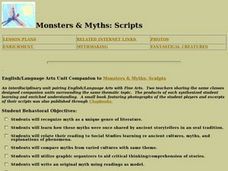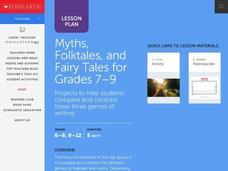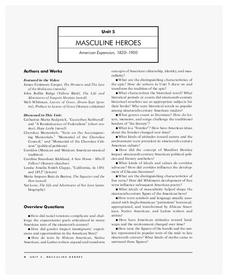Curated OER
Monster and Myths: Scripts
Students explore characteristics of the myth genre. In this myth lesson, students become familiar with various myths and the cultures they were derived from. Students compare in a graphic organizer. Students write original myths and...
Curated OER
Text Elements—Vampires
Students explore the tone and style of passages from horror genre literature. For this literary elements lesson, students read The Vampire by John Stagg and the War of the World script by H.G. Wells, Students write about the way the...
Curated OER
Animal Tales Around the World
Students explore characteristics of Indian Tales/ Parables. In this literature lesson, students compare contemporary society to western culture through analysis. Students create their own tales using this genre.
Scholastic
Myths, Folktales, & Fairy Tales for Grades 7-9
Here is a must-have resource for studying fairy tales, myths, and folktales with your class! It includes instructional ideas, activities, and materials to support a month-long review of these three unique genres of writing.
Curated OER
Creating a Science Fiction Story
As the culminating activity in a unit study of science fiction, young writers demonstrate their understanding of the genre by producing their own graphic novel. After deciding on the main elements of their story, individuals use a comic...
Curated OER
Come On, Rain!
Students read and analyze the story. In this language arts lesson, students read Come on, Rain! and examine how mood and tone are created, the use of figurative language and the characteristics of the genre. Students research the time...
Curated OER
Oliver Twist Goes to Hollywood
How does Oliver Twist, the novel written by Charles Dickens, compare with its screenplay adaptation? Although the activity doesn't require learners to have read the novel, the similarities and differences of the highlighted passages...
Annenberg Foundation
Slavery and Freedom
How do nineteenth-century texts by African American and Native American writers contribute to the country's ideals of freedom and individuality? Learners explore the topic by watching and discussing a video, reading biographies, writing...
Curated OER
Character Traits: Yang the Youngest and His Terrible Ear
Lensey Namioka’s Yang the Youngest and His Terrible Ear provides an opportunity for young readers to observe how writers bring their characters to life. Each class member selects a character to trace through the novel, recording...
Annenberg Foundation
Masculine Heroes
What were the driving forces behind American expansion in the nineteenth century, and what were its effects? Scholars watch a video, read biographies, engage in discussion, write journals and poetry, draw, and create a multimedia...
Curated OER
Men of Steel
Learners explore early 20th century steel making. In this U.S. history steel making lesson, students view and describe a postcard and a picture depicting exaggerated aspects of the steel industry. Learners listen to a poem about Joe...
Curated OER
"Knot" the Whole Truth: Writing a Modern-Day Story with a Tall Tale's Voice
Beyond Paul Bunyan and his blue ox, tall tales can be a great way to teach young writers about word choice and voice in their writing. Using Jerry Spinelli's Maniac Magee and the Six-Trait Writing process, they begin to write their own...
Curated OER
Narratives
Add to the narrative writing experience. Elementary or middle school writers listen to the teacher read a descriptive passage, then reread the same passage silently. They highlight sensory details and figurative language, then orally...
Curated OER
Personalized Poetry Portfolio
Eighth graders create their own poetry portfolio containing poems that relate to Students' lives and families. The portfolio consist of the following types of poems: acrostic, diamante`, haiku, cinquain, and free verse.
Curated OER
Wycinanki and Polish Folktales
Learners, with the use of the Internet among various other resources, research/locate Polish folktales and re-tell the Polish folktales in their own words. In addition, they examine the art of Wycinanki, Polish paper cutting.
Curated OER
Analyzing Elements of a Memoir
Students analyze and identify elements of memoirs. In this literature lesson students explore qualities to listen for while the teacher reads a memoir; they then break into groups and analyze a memoir independently.
Curated OER
Christmas Carol Project
Eighth graders create a researched presentation comparing and contrasting holiday celebrations from the period surrounding Charles' Dickens 'A Christmas Carol.' In this Christmas celebrations lesson, 8th graders discuss differences...
Curated OER
A Movie in Your Mind: Persuasive Text
Students listen to a broadcast of War of the Worlds and illustrate what they hear. In this persuasive text lesson students prepare for making a movie poster intended to persuade a director to make a film based on a short story.
Curated OER
Poetry Analysis Device: TPCASTT
Learners analyze the key elements of poetry using a mnemonic device. The device: TPCASTT (title, paraphrase, connotation, attitude, shifts, title and theme).




















